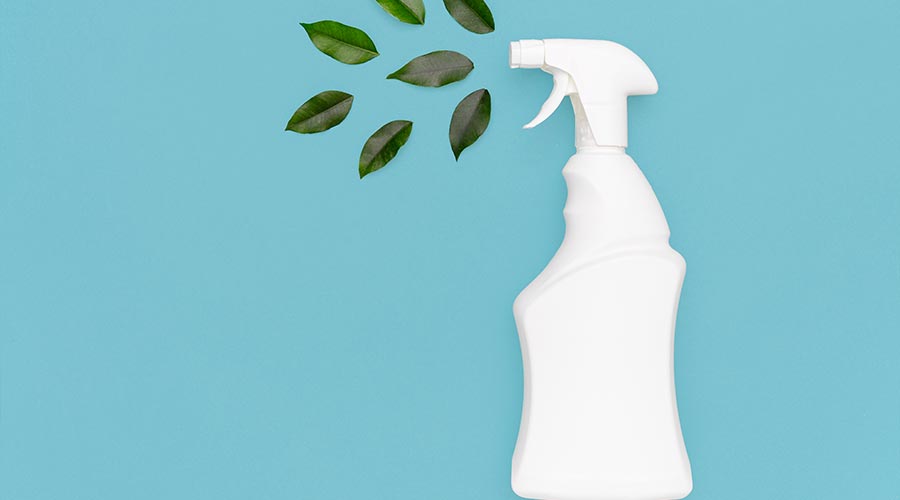
During the pandemic, green cleaning initiatives often took a backseat to infection prevention concerns as facilities ramped up their efforts to eradicate COVID-19. Five years on, though, eco-friendly products and practices are seeping their way back into the collective conscience of building service contractors and their clients.
Truth be told, green cleaning programs and effective infection prevention practices are not mutually exclusive. As an increasing number of facilities demand both, BSCs are being called on to select products that align with sustainability goals while maintaining high standards of cleanliness.
John Herrera is chief revenue officer at Maintex Facility Solutions, a distribution company based in California, which is one of the leading states in sustainability.
“Primarily, it’s customers and the market that’s driving demand [for sustainable products] through regulatory action at state and government levels,” he says. “But at the end of the day, this is something that can really benefit frontline workers and overall operations because you’re working with products that are safer for people.”
One of the main downstream benefits for BSCs, says Herrera, is building a stronger, more sustainable culture that emphasizes people’s health.
A Leg Up on Competitors
No doubt, developing a sustainable cleaning program that incorporates green cleaning chemicals, as well as disinfectants, can provide BSCs with an edge over the competition.
“The biggest thing we’re seeing with contractors is a need for eco-friendly products,” notes Jason Gaskin, sales manager at Lann Chemical, Aberdeen, Mississippi. “We have some contractors that really lead with that. They come in and clean in an economical, green-friendly way, and it gives them a leg up on traditional contract cleaners.”
Gaskin shares that when green cleaning products first started making their appearance on the market in the early 2000s, they lacked the efficacy of traditional chemicals, and many people considered them a failure. Fortunately, times have changed.
“Over the years, they have improved, and now a lot of the ‘green’ products are better than the traditional options,” he says. “Today, we can supply BSCs with a list of eco-friendly product offerings that cover every cleaning category.”
Alongside regulations that mandate sustainable products and practices, Angel Rodriguez, director of chemical sales East, Imperial Dade, Jersey City, New Jersey, is seeing more BSCs adopt green products in response to customers pursuing LEED certification, providing them with another opportunity to ensure relevance in the marketplace.
“Contract cleaners can promote that they use green products, and that sustainability is a priority or driving factor of their business so that they stand out to those who are looking to get LEED certified,” Rodriguez notes.
Green Seal of Approval
When it comes to selecting cleaners and disinfectants that meet customer demand for environmentally responsible products, distributors advise BSCs to choose those that have been tested and certified by a third party.
“What’s great about the sustainability movement in our industry is that there are third-party independent certification entities that have created standards for green products and hold people accountable for meeting those standards,” Herrera says. “It establishes a level of trust that these products have been reviewed, the ingredients in them are safe, and they have been performance-tested.”
Distributors advise contractors to look for products certified by one of the following three agencies:
Green Seal — This is a global non-profit organization that tests cleaning products and verifies their safety for human health and the environment. Green Seal-certified products are made without harmful chemicals, have low volatile organic compounds (VOCs), and do not contain per- and polyfluoroalkyl substances (PFAS). Green Seal does not certify disinfectants.
Safer Choice and DfE — The U.S. Enviornmental Protection Agency’s (EPA) Safer Choice label covers a broad range of cleaning products while the agency’s Design for the Environment (DfE) label covers EPA-registered antimicrobial products. The Safer Choice and DfE programs review all chemical ingredients to ensure they are safe for people and the environment.
EcoLogo — The EcoLogo program certifies cleaning products and disinfectants for reduced environmental and health impacts. Certifications are voluntary and indicate a product has undergone rigorous scientific testing and auditing. EcoLogo is based on the International Standards Organization (ISO) 14024 standard for ecolabeling and is managed by UL Solutions.
Dissecting the Role Disinfectants Play in a Green Program

 Celebrating BSCAI's 60th Anniversary eBook
Celebrating BSCAI's 60th Anniversary eBook The Down and Dirty on Cleaning in Virus Season
The Down and Dirty on Cleaning in Virus Season How Surfactant Use is Expanding in Commercial Cleaning
How Surfactant Use is Expanding in Commercial Cleaning